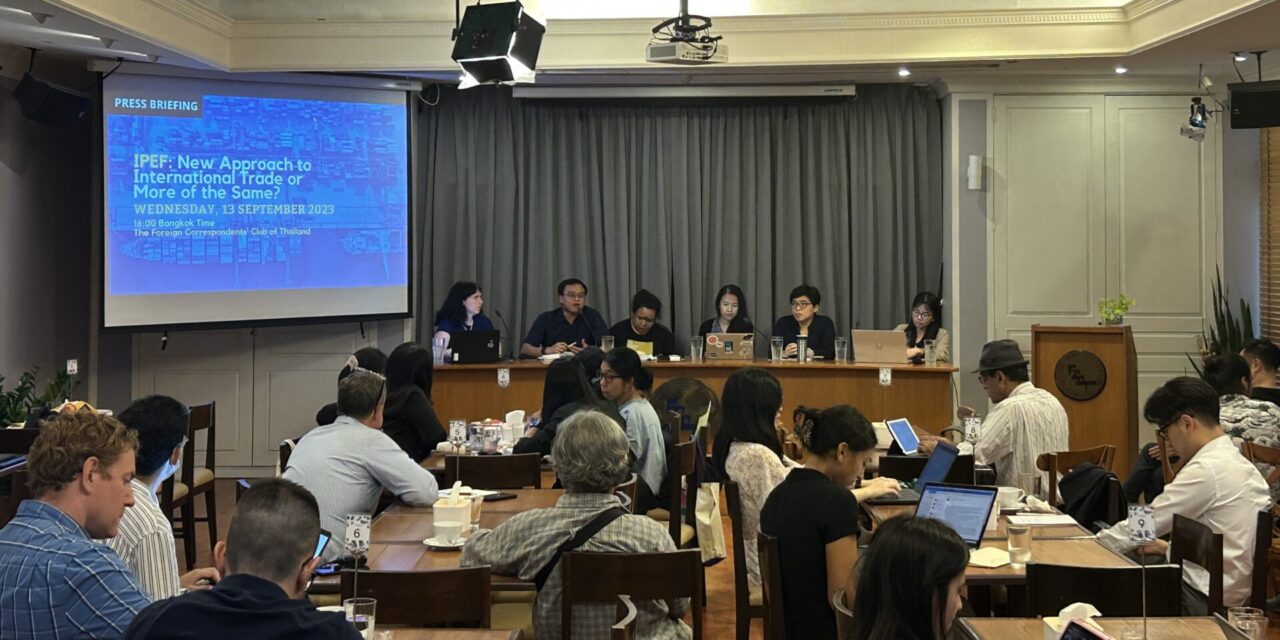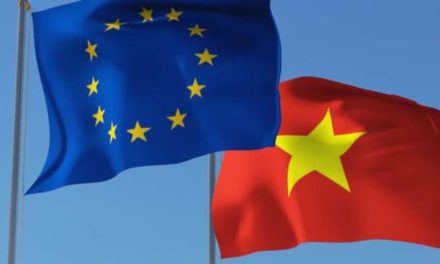As international trade deals continue to evolve, the Indo-Pacific Economic Framework (IPEF) is being negotiated between multiple nations in the Asia-Pacific region. With the United States (U.S.) taking the lead, its members include Australia, Brunei Darussalam, Fiji, India, Indonesia, Japan, the Republic of Korea, Malaysia, New Zealand, Philippines, Singapore, Thailand, and Vietnam. Despite its claimed benefits for economic cooperation, critics argue that in fact it’s designed to advance U.S. corporate interests and an avenue for multinational companies to mold the labor force according to their specific needs, possibly diminishing the role of conventional occupations. Another point of contention surrounding the IPEF is its secretive negotiations. The framework’s details were only disclosed after the conclusion of the supply chain pillar, sparking concerns over its transparency and the motives behind such guarded discussions.
In a press briefing held today at the Foreign Correspondents’ Club of Thailand (FCCT), experts from civil society organizations gathered to discuss and dissect the potential ramifications of IPEF. The session, attended by journalists from various media outlets, aimed to shed light on concerns surrounding the framework and its wide range of possible impacts including on: gender equality, the environment, digital rights, labor rights, and local livelihoods.
Hien Nguyen Thi of the Asia Pacific Forum on Women, Law and Development (APWLD) set the tone with a potent assertion about gender and trade: “Trade is not gender neutral. Women from the Global South are unlikely to reap benefits from the IPEF when multinational corporations’ interests take precedence. Describing women as an ‘untapped resource’ for economic growth is merely scratching the surface. Genuine initiatives for women should be both by and for them. This includes the vast majority who are directly or indirectly affected by IPEF – be it farmers, fisherwomen, nurses, or the rural and urban poor. Corporations should not be allowed to exploit them under the guise of profit.“
Building on this, Melinda St. Louis of Public Citizen’s Global Trade Watch, a U.S. consumer organization, delved into the intricacies of the IPEF and the broader implications it holds for the world. “U.S. civil society groups have been organizing for decades against neoliberal trade policy that prioritized multinational corporate profits over workers and the environment. President Biden has responded to the changed political reality and claims that his Indo-Pacific Economic Framework (IPEF) initiative will not be a traditional free trade agreement and will center workers’ interests. The devil will be in the details, however, as U.S. Big Tech and other multinational companies continue to push for IPEF terms that will maximize their profits at the expense of people and the planet. As negotiators meet in Bangkok this week to rush to conclude a deal, U.S. civil society groups stand in solidarity with Thai and other colleagues across the Asia Pacific to demand transparency and for our concerns to be heeded before it’s too late to make changes.“
Benjamin Alvero from the Center of United and Progressive Workers (SENTRO) shed light on the potential repercussions of the IPEF on labor standards across the region. “IPEF is presented as a centerpiece of the Biden administration’s worker-centered trade policy, but aside from public statements and speeches, we workers have no direct access to the contents of the framework which is supposed to be for us. Our unions, especially in the global south, have largely been excluded in the negotiation process. This is worrisome. How can we ensure that IPEF will be positive for workers if many details are absent in the public discussion – scope, enforcement, incentives, sanctions – working people are not in the loop when it comes to these substantive questions.
All we know, in the Philippines and elsewhere, is the bitter experience of previous trade policies, marked by systematic deregulation, privatization, and the accompanying massive job loss and widespread precarious work. How can we be sure that IPEF won’t lead to the same thing, aside from assurances from the negotiators?”
Prapasiri Suttisom from EngageMedia emphasized how IPEF also has implications on digital rights. “We must consider the implications for transparency, accountability, and our ability to ensure that technology is used in a way that respects our rights, accountable, and non-discriminatory. The IPEF’s provisions regarding cross-border data transfer and source-code disclosure are not merely trade matters, they are digital rights matters.”
Providing a localized perspective, Chayuda Boonrod from Assembly of the Poor (AoP) shared concerns from Thai agricultural sector related to peasant’s rights and people’s rights to food: “Neoliberal economic policies including IPEF put pressure on agriculture sector to rely on industrial food production model which is heavily dependent on the use of chemicals from big companies. It also creates food price speculation that leads to global food crises.
Food is fundamental, access to quality food guarantees the quality of life for the whole society. As small-scale farmers, we refuse all kinds of trade negotiations and economic frameworks that deprive smallholder farmers of their rights and people’s rights to food. The Thai Government must not take agriculture into trade negotiations, ensure transparency, and promote public participation in monitoring trade negotiations. The most worrying thing right now is that we know nothing about this economic framework.”
Addressing biosecurity concerns, Kannikar Kijtiwatchakul, the Vice Chairperson of FTA Watch, Thailand, drew attention to the impending uncertainties surrounding Genetically Modified Organisms (GMOs) in Thailand due to the IPEF. “Regarding the GMOs labeling, after a long fight for protecting consumers’ rights, recently the Thai Ministry of public health issues several food regulations requiring food firms to declare any use of genetically modified ingredients on food labels. Within 2 years (grace period) from now by the end 2024 all food labels in the market must comply with these regulations. Any trade negotiations including IPEF that weaken or undermine consumers’ rights and the ability to regulate GMOs will face strong resistance.”
Joseph Purugganan from Focus on the Global South summarized the session’s sentiment, stating, “The consensus was evident: IPEF, despite being touted as a new model for trade, appears to be heavily tilted towards mega-corporations and tech giants. The lack of transparency in its negotiations and the haste to finalize it, compounded by the geopolitical tussle between the U.S. and China in the Asia-Pacific, raises red flags. Governments are urged to carefully reflect, to place their citizen’s welfare above corporate windfalls, and to ensure that the IPEF, in essence, aligns with the aspirations and rights of those it stands to affect.“
Media Contact:
Anisa Widyasari: [email protected]




![[IN PHOTOS] In Defense of Human Rights and Dignity Movement (iDEFEND) Mobilization on the fourth State of the Nation Address (SONA) of Ferdinand Marcos, Jr.](https://focusweb.org/wp-content/uploads/2025/07/1-150x150.jpg)



